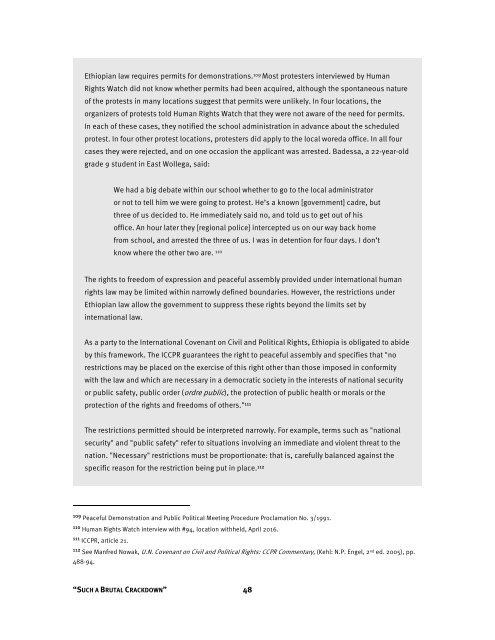“Such a Brutal Crackdown”
ethiopia0616web
ethiopia0616web
Create successful ePaper yourself
Turn your PDF publications into a flip-book with our unique Google optimized e-Paper software.
Ethiopian law requires permits for demonstrations. 109 Most protesters interviewed by Human<br />
Rights Watch did not know whether permits had been acquired, although the spontaneous nature<br />
of the protests in many locations suggest that permits were unlikely. In four locations, the<br />
organizers of protests told Human Rights Watch that they were not aware of the need for permits.<br />
In each of these cases, they notified the school administration in advance about the scheduled<br />
protest. In four other protest locations, protesters did apply to the local woreda office. In all four<br />
cases they were rejected, and on one occasion the applicant was arrested. Badessa, a 22-year-old<br />
grade 9 student in East Wollega, said:<br />
We had a big debate within our school whether to go to the local administrator<br />
or not to tell him we were going to protest. He’s a known [government] cadre, but<br />
three of us decided to. He immediately said no, and told us to get out of his<br />
office. An hour later they [regional police] intercepted us on our way back home<br />
from school, and arrested the three of us. I was in detention for four days. I don’t<br />
know where the other two are. 110<br />
The rights to freedom of expression and peaceful assembly provided under international human<br />
rights law may be limited within narrowly defined boundaries. However, the restrictions under<br />
Ethiopian law allow the government to suppress these rights beyond the limits set by<br />
international law.<br />
As a party to the International Covenant on Civil and Political Rights, Ethiopia is obligated to abide<br />
by this framework. The ICCPR guarantees the right to peaceful assembly and specifies that "no<br />
restrictions may be placed on the exercise of this right other than those imposed in conformity<br />
with the law and which are necessary in a democratic society in the interests of national security<br />
or public safety, public order (ordre public), the protection of public health or morals or the<br />
protection of the rights and freedoms of others." 111<br />
The restrictions permitted should be interpreted narrowly. For example, terms such as "national<br />
security" and "public safety" refer to situations involving an immediate and violent threat to the<br />
nation. "Necessary" restrictions must be proportionate: that is, carefully balanced against the<br />
specific reason for the restriction being put in place. 112<br />
109 Peaceful Demonstration and Public Political Meeting Procedure Proclamation No. 3/1991.<br />
110 Human Rights Watch interview with #94, location withheld, April 2016.<br />
111 ICCPR, article 21.<br />
112 See Manfred Nowak, U.N. Covenant on Civil and Political Rights: CCPR Commentary, (Kehl: N.P. Engel, 2 nd ed. 2005), pp.<br />
488-94.<br />
“SUCH A BRUTAL CRACKDOWN” 48


